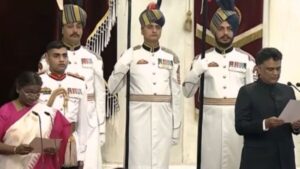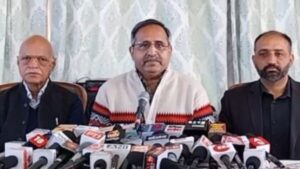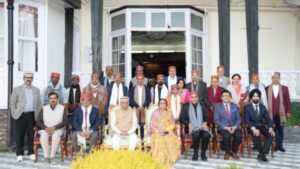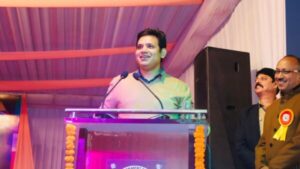What is terrorism, Countering Terrorism, terrorism in 2023
The Border Security Force (BSF) of India plays a critical role in countering terrorism and ensuring the security of the nation’s borders. Here are a few ways in which the BSF works to counter terrorism:
- Intelligence gathering: BSF personnel are trained to gather intelligence about potential terrorist activities, and work closely with other intelligence agencies to stay informed about potential threats. This helps the BSF to be proactive in preventing terrorist attacks and neutralizing potential threats.
- Border patrolling: BSF personnel are deployed along India’s borders with Pakistan and Bangladesh to prevent the infiltration of terrorists into the country. They use a variety of surveillance tools, including night vision devices, thermal imaging cameras, and unmanned aerial vehicles, to monitor the borders and detect potential threats.
- Counter-insurgency operations: BSF personnel are trained in counter-insurgency operations and work closely with the Indian Army and other security forces to neutralize terrorists in Jammu and Kashmir and other areas of conflict. They are equipped with the latest weapons and technology, including bulletproof jackets and body armor, to provide them with maximum protection while they carry out their duties.
- Joint operations with other security agencies: The BSF works closely with other security agencies, including the Indian Army, Central Reserve Police Force, and National Security Guard, to carry out joint operations against terrorists. This helps to ensure that the resources and expertise of different agencies are utilized to maximum effect, and enhances the overall effectiveness of counter-terrorism efforts.
- Community engagement: The BSF also engages with local communities along the border to gather intelligence and foster goodwill. By working closely with the local population, the BSF is able to build trust and gain valuable insights into potential terrorist activities.
- Technological advancements: The BSF invests in and implements the latest technologies to enhance its counter-terrorism capabilities. This includes the use of advanced surveillance systems, such as unmanned aerial vehicles and thermal imaging cameras, to monitor the border and detect potential threats.
- Physical and logistical preparation: The BSF maintains a strong physical presence along India’s borders, with personnel stationed at key points to provide rapid response in case of a threat. The BSF also invests in the logistics and infrastructure required to carry out effective counter-terrorism operations, including transport, communications, and medical support.
- Collaboration with international agencies: The BSF works with international security agencies, such as Interpol, to share information and coordinate counter-terrorism efforts. This helps to enhance the overall effectiveness of counter-terrorism operations and ensures that the BSF is aware of the latest developments in terrorism globally.
- Specialized units: The BSF has a number of specialized units, such as the Commando Battalion for Resolute Action (COBRA) and the Water Wing, that are trained and equipped to deal with specific types of threats. These units are able to respond quickly and effectively to any incidents of terrorism that may occur.
- Community policing: The BSF engages with local communities along the border to create a sense of security and build trust. By working with the local population, the BSF is able to gather valuable intelligence and address any issues that may arise.
These are just a few more examples of the measures that the BSF is taking to tackle the threat of terrorism and ensure the security of India’s borders. With its commitment to serving the nation and its highly trained personnel, the BSF continues to play a critical role in maintaining the security and stability of the country.
Multifaceted Terrorism
Countering terrorism is a complex and challenging task that faces many obstacles and problems. Here are a few of the main challenges faced by security agencies in countering terrorism:
- Radicalization: The rise of radical ideologies, particularly those associated with extremist groups, has led to an increase in the number of individuals who are willing to carry out acts of terrorism. This makes it more difficult for security agencies to identify and neutralize potential threats, as individuals who may be radicalized may not be known to authorities until they carry out an attack.
- Lack of resources: Many security agencies, including those in developing countries, face a shortage of resources, which makes it difficult for them to carry out effective counter-terrorism operations. This can include a lack of personnel, funding, and technology, which can limit their ability to respond to threats and carry out operations.
- Complex nature of terrorism: Terrorism is a complex and multi-faceted issue that cannot be effectively addressed by security agencies working in isolation. The involvement of transnational networks and the use of technology make it more difficult for security agencies to respond to threats and neutralize terrorists.
- Legal and human rights issues: Counter-terrorism operations often raise legal and human rights issues, such as the use of controversial techniques like enhanced interrogation or the suspension of civil liberties. Balancing the need to maintain security with the protection of civil liberties and human rights is a complex challenge that requires careful consideration.
- Political instability: Political instability and conflict in many regions around the world provide fertile ground for the growth of terrorism. When governments are unable to provide security and stability, extremist groups can take advantage of the situation to carry out acts of terrorism.
These are just a few of the many challenges faced by security agencies in countering terrorism. Addressing these issues requires a coordinated and multi-disciplinary approach, which involves collaboration between different agencies, countries, and organizations.

Continuing the achievement of the journey of effectiveness and credibility of more than 10 years in the career of journalism, as a woman journalist, I am Serving as the founder, promoter and editor of DiaryTimes with the trust and support of all. My credible coverage may not have given a big shape to the numbers, but my journey presents articles that make you aware of the exact and meaningful situations of Himachal’s politics, ground issues related to the public, business, tourism and the difficult geographical conditions of the state and financial awareness. DiaryTimes, full of the experience of my precise editorial expertise, is awakening the flame of credible journalism among all of you, so that the eternal flame of meaningful change can be lit in the life of the people of the state and the atrocities being committed against the people can be brought to the fore, I am motivated for that. If even a small change comes with the power of my journalism and the whole world becomes a witness to that issues, then I will consider myself fortunate.







